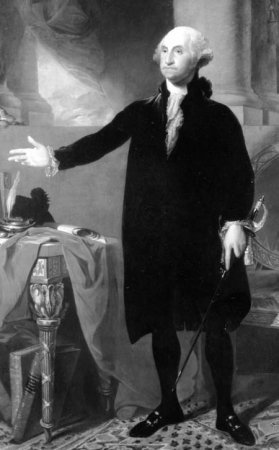George Washington
Identification: President of the United States, 1789-1797
Born: February 22, 1732; Bridges Creek (later Wakefield), Westmoreland County, Virginia
Died: December 14, 1799; Mount Vernon, Virginia
Significance: In addition to being the first U.S. president and commanding general of the Revolutionary War, Washington was one of the richest men in the American colonies on the eve of the American Revolution.
Although better remembered for his political and military career, George Washington had a critical role in the business and financial life of the early United States. Born into Virginia plantation gentry (but not the highest rank), Washington was educated by tutors and early learned to be a surveyor, a skill that not only assisted his early military career but also helped develop his lifelong interest in land speculation. Although his father and older half brother both died before he was twenty,Washington began a successful agricultural career at Mount Vernon. He did not inherit his land until he was thirty, but his marriage to the wealthy widow Martha Custis when she was twenty-seven provided him with great wealth early in life.
A successful manager of land and slaves, Washington was also a tireless entrepreneur of agricultural industries. Washington manufactured a wide range of farmequipment and was the largest brewer in America. Of necessity, he was heavily involved in the import-export business.
George Washington. (White House Historical Society)
As one of the wealthiest men in America, Washington had a fundamental understanding of what government had to do to create an environment conducive to business and finance. His distress at Great Britain’s failed colonial economic policy was partly what led to him to join the revolutionary cause. The failure of the Articles of Confederation led him to preside over the drafting of the U.S. Constitution, which was critical to the early economic success of the nation.
Washington agreed to serve as the first U.S. president to further secure America’s business development and to ensure that its new government would be established successfully. He chose Alexander Hamilton, the brightest economic mind in the country at the time, as the first secretary of the Treasury. Hamilton’s plans were contained in a series of major reports: the Report on the Public Credit, January, 1790, Second Report on the Public Credit, December, 1790, and the Report on Manufactures (1791).
In his reports, Hamilton made his case for fully funding all Revolutionary War debt, creating the First National Bank, founding the Merchant Marine, and imposing the first internal tax. These measures laid the foundation for America’s early economic progress. The U.S. public credit moved from near bankruptcy to enjoying the highest international credit rating in a dozen short years. Washington’s recognition that the United States could not afford to fight a war with either Britain or France led him to hold fast to a foreign policy of peace despite numerous insults from America’s foreign competitors.
Richard L. Wilson
See also: First Bank of the United States; Colonial economic systems; Benjamin Franklin; Government spending; Hamilton, Alexander; U.S. Presidency; Taxation.

